Date: 11 janvier 2012 09:24:39 HNEC
To: Joseph Tang <info@galeriejosephtang.com>
Subject: to be read 10
Dear Joseph
The empty corner, probably the one wall I used the most when I inhabited the space, when I worked there, please leave it empty, a bare wall. It also holds the empty cavity from a bullet. The remains of the bullet is in my apartment. I think you filled the hole in. Anyway, I like the white wall, something is missing. The only thing I would like to do is to come in and throw some stones at it, mark the wall, physical marks from stones found in Paris, and thrown by me. Hard, hard on to the wall. Remove the stones and just leave the wounded wall.
Your comment yesterday regarding me dealing with your electrical sockets that I installed some 3 1/2 years ago was a good remark. Sudden vanity. Sometimes one falls into the bucket of filth. I actually did not have a problem with them, but I never thought of it in that way, them annoying me, I liked that, sockets. Reconnecting with one's practical aesthetics, but now not wanting to understand the practical need all of a sudden, only ones ego, selfish load, and when one wades knee high in ones owns filthy vanity of absolute nothing a smile might occur if you…? Today I am at ease with the sockets.
YSL, Yves Saint Laurent, If you can remember the little story, please feel free to let it develop, chinese whispers. I do think the two trench coats will find their way to the chair and become that sculpture they should be, the work they are.
People often get confused, in your case confusion is only driven by capital investment. Their limited understanding being dictated by a monger, one who sells his soul for capital. They misunderstand what they have in front of them because what they just came from did not have the same shape. Limitations dripping off their foreheads.
To invest, I have invested, I will invest, I invested, I invest. Todays investment is most often in a trend that a monger has managed to hype up. Sign the fucking contract. Yet another art object referring to an -ism sold by a youngster that most probably will be a hairdresser before he / she is forty. So did you know that Green, White and Black pepper comes from the same plant, not the same flavour, not the same colour, but the same root, the same mother, the same womb, the only exit the same pussy or should I say cunt.
What you hear is not what I am trying to say, but what you thought I said.
What you understood is not what I said, but what you thought you heard.
What I said is maybe not what you have heard, but what you chose to hear.
What you have understood is not what I said, but what you chose to understand.
What I mean is not what I say, but what you think you understand.
(Victor Boullet 2008)
This work will function best when you leave the gallery for the day, when you turn the lights off and double lock the door behind you. When silence is the main feed. When there is no light, no human disturbance, no nonsense, only the work standing, hanging lifeless, and nameless in an empty shut room for no reason at all.
11-01-12
Paris
Victor Boullet
From: Mr Victor Boullet <comb_over@me.com>
Date: 9 janvier 2012 14:20:06 HNEC
To: Joseph Tang <info@galeriejosephtang.com>
Subject: to be read 9
Dear Joseph
Sticking a knife deep into my own stomach and then tearing it wide open right up to the ribcage so all the intestines drop down on to the floor, for me to see, for me to smell, for me to touch, for me to eat. I did not dream that last night nor is it how I feel today.
The silence and pride is a need that I have longed for. I feel good.
Some of this work has been done with broken ribs, the pain has been excruciating.
Disabled I have been.
For the bigger canvases, the lower part, I was unable to finish, could not reach down.
The one work that hangs on your wall was made before I had my accident with the ribs, so the progression has been with a limp so to speak i.e. the other wall work has been made while injured.
I think the show has become better because of the pain and disability.
I have had to slow certain things down in order to make them, or even think about them.
That has been good for this transition from the past to the present.
Hail the indestructible body.
Morton Feldman fell out with his long time friend Philip Guston, because Mr Guston changed his style of painting. This story has amused me for years, I think I have almost even wanted that, it's like from The ISH to who I am today, the change.
Morton Feldman was invited to Philip's funeral. After the burial they all went back to Philip's studio, where Philip's wife, Musa and their daughter Musa had hung some of his latest drawings on the wall. Everybody in the room was aware of Mr Feldman, because he could not concentrate on the conversation, his eye was always directed to the walls with the work.
He finally walked over to the drawings and looked at them. He had not spoken to his best friend for over ten years, abstract expressionism to his well known cartoon like style being the reason. I am not sure what went through Mr Feldman's head while he was looking at the drawings. He returned to the group of people and stated very mutely ''now I understand what he was getting at'' I for one have not come to what he understood, and if I did understand it, I would not share it because I know the feeling he felt.
Philip Guston was also a lucky man, he died just after he had eaten his dessert, at the table, with an empty glass of Italian wine, his head just fell down, dead.
Morton Feldman collected oriental rugs, as I will one day.
The line between the two wooden sculptures will stay as a reminder of what will come, my future work will be somewhere in the middle of the constructions, I did make it, but it failed this time and got screwed to the wall, you can find there, in your space, part of the sculpture.
Paris
Victor Boullet
From: Mr Victor Boullet <comb_over@me.com>
Date: 7 janvier 2012 13:15:30 HNEC
To: Joseph Tang <info@galeriejosephtang.com>
Subject: To be read 8
Dear Joseph
Today I will focus on the walls like a schizophrenic rapist that has broken out of an air tight cement cube with no exit that was dropped into the abyss of forgotten fuck.
I felt a great joy lifting the wood into place yesterday, a relief of some sort, but, that said, this has now come to an end, it will have to stand up and be counted. I will speak of the white line that connects the sculptures at a later stage, maybe tomorrow.
On that note I would like to share this little story with you, I think this carries the meaning of what I am trying to understand or is it just an allegory of something deeper within me?
The next day I go to Balka's studio in Otwock, a spa town close to Warsaw, where he grew up. Until the second world war, most of the population was Jewish, and they all ended up at Treblinka. Balka tells me about a local Jewish cemetery, an abandoned place with bones poking out of the sandy soil. A visiting American curator picked one up to take home as a souvenir, before Bałka stopped her. He still sounds aghast at the thought of it.
Am I the bone, the curator, the artist or the cemetery? I do not know!
Do I care? I do not know!
I might be a souvenir or am I becoming a souvenir, trying to be reborn as a souvenir? If so, I have lost my train of thought. That reminds me of the photograph of Einstein on the beach and one of my sculptures from the beach in Scotland.
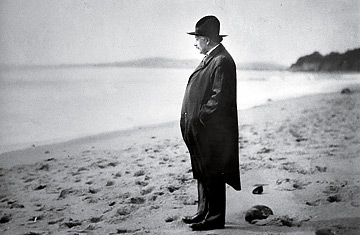
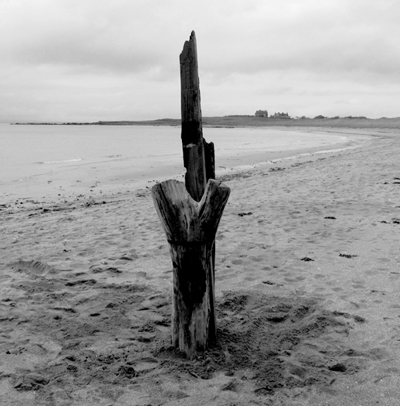
I share here with you a passages from the opera Einstein on the Beach.
I think it's has an importance for the content of the wall work that is in progress for the show. This is a passage, maybe my favourite passage from the opera.
I say favorite, but actually in my reality there is never a favourite.
Favourite is only a moment of pleasing a good feeling, a need, a craving and lust. Favourite stops any possible progression in life, it blinds ones view of the unknown that could lead you to the next favourite. In my world favourite is the ego greed, when it should be used as a stepping stone.
Twenty years of listening and I have finally come to like this particular album of wonderful music, Einstein on the Beach by P Glass. In fact, I can't live with out it today and that being said, neither can I live without chicken or Bach.
WITNESS : PREMATURELY AIR CONDITIONED SUPERMARKET
(Lucinda Childs, To be recited from lying on bed through exit)
I was in this prematurely air-conditioned super market
and there were all these aisles
and there were all these bathing caps that you could buy
which had these kind of Fourth of July plumes on them
they were red and yellow and blue
I wasn't tempted to buy one
but I was reminded of the fact that I had been avoiding
the beach.
The amazing Richter, Kempf and Bylsma.
Paris
Victor Boullet
From: Mr Victor Boullet <comb_over@me.com>
Date: 5 janvier 2012 13:03:10 HNEC
To: Joseph Tang <info@galeriejosephtang.com>
Subject: To be read 7
Dear Joseph
I will come by the gallery today just to hang some small drawings / works that were made on the beaches of Scotland last summer.
These drawings, or charcoals on paper to be correct, were made for no reason at all, they have no mission in our world or society other then reminding me of where I might have come from, or what I can become.
I made the charcoal by burning pieces of furniture that belonged to my family in Scotland.
Some of the charcoal also originates from driftwood that was used for making fire on the beach.
I saw the water being sucked into the paper, I saw the charcoal withdraw from the paper.
I rubbed the paper with sand, sand that I can speak about in the split second of doubt.
I burnt the belongings of my family and smeared the affection onto the paper with great physical strength, only to rub it off again. Like peeling off ones flesh to become something quite different, a different thing.
These works on paper are an imprint of a place, a birth place, a place where we died.
I fall, I fell.
I dig holes on the beach, I fill the holes after they were dug.
I dig another hole, and fill it up with sand from the hole that I dug before the hole I am just about to fill.
I left the beach as it was.
Maybe even these works will make their way onto the walls, maybe I am standing in the way of my own progression.
I have unfinished work to be done.
Paris
Victor Boullet
From: Mr Victor Boullet <comb_over@me.com>
Date: 4 janvier 2012 20:39:20 HNEC
To:Joseph Tang <info@galeriejosephtang.com>
Subject: Re: To be read 6
Dear Joseph
I received your reply, thank you, the journey continues, i.e ditto.
I wrote this yesterday and I have decided to send it to you today, the text survived the night. All systems go.
The domestic fabric projects the time that had no reason. Existential stabs at already dead material made by man, destroying something again that only serves us for practical use?
Vandalizing something, or then again vandalizing nothing, because it was born dead.
In fact I give it life, my life. Beauty appears and I embrace it for no good reason.
The wood is the spine of everything thought, it is where I come from, who I am in a proud moment of self confession. I smell the wood and feel an inner understanding of a job done and to be conquered. This wood is man made, cut by man, it's made to serve the human being and his self made rules of weight and strength. The wood will serve no purpose at all, it will become a metaphor for doubt and failure, but also a personal success of failing on a grand scale.
The practical metal speaks a foreign language of all death to come. This machine will grind all pieces of flesh that are inedible. The machine provides mankind with more economical flesh of death. The machine is a practical tool that points us towards the mass production of consumerism. The machine is a readymade symbol of our cynical behavior.
This machine is the janus, my janus, I am janus.
As this is being written it occurs to me that it is essential and of great importance that I block all daylight entering this room. This work, this job needs no daylight. It should only survive on man made fluorescent light. Can't have daylight. It should suffocate and die the only death it deserves, a long slow death.
Paris
Victor Boullet
From: Mr Victor Boullet <comb_over@me.com>
Date: 4 janvier 2012 at 14:28 PM HNEC
To: Joseph Tang <info@galeriejosephtang.com>
Subject: To be read 5
Dear Joseph
I would like to share some more thought with you. Even if I am not sure I should
share these quotes, as they have been a hidden layer of my existence not to be talked about, because my life is not one that will mirror the academic moronic wank that is expected by a world about to tumble.
This was written less than a day before Mr Wittgenstein completely lost consciousness
"If someone believes that he has flown from America to England in the last few days, then, I believe, he cannot be making a mistake.
And just the same if someone says that he is at this moment sitting at a table and writing.
But even if in such cases I can't be mistaken, isn't it possible that I am drugged?"
If I am and if the drug has taken away my consciousness,
then I am not now really talking and thinking. I cannot seriously suppose that I am at this moment dreaming. Someone who, dreaming, says "I am dreaming", even if he speaks audibly in doing so, is no more right than if he said in his dream "it is raining", while it was in fact raining. Even if his dream were connected with the noise of the rain."
(Ludwig Wittgenstein)
Today I took down the practical wood structure with you, after three weeks of living in the unused space, unseen, except by the creator and the owner. The structure is now redundant, dead, dead, dead, death, die, die.
I have to thank you for you generous, gentle way of managing the wood. The sound when we dragged the wood along the floor gave me hope, future hope, needs. The wood knocked it self into the walls like it was fighting, almost resisting the deconstruction.
We took it down. I felt the downfall of my work. I am not sure, today, right now, that is this second, if there will even be a show, an art show. In a way I have done my work. I have nothing more to do.
Paris 4 January 2012
Victor Boullet
From: Mr Victor Boullet <comb_over@me.com>
Date: 4 janvier 2012 13:57:26 HNEC
To: Joseph Tang <info@galeriejosephtang.com>
Subject: To be read 4
Dear Joseph, This was written the day before the practical structure was taken down from the show Anstruther Scotland. A title that carries no meaning today.
Ludwig Wittgenstein's last words were
"Tell them I've had a wonderful life"
As I have decided to relinquish control over yet another conceptual thought or idea that could have given me some sort of recognition, I would like to add some words about the content, if there is one that is, of this show.
The Institute of Social Hypocrisy, was a sculpture, a time capsule, a piece and a platform for critique. Now this architectural space that is situated about 8 meters above French soil has become a gallery space for commercial art activity.
All the 35 projects that took place in and from this space were rooted in a contemporary conceptual ideology that instantly gave a meaning that allowed the viewer to understand what was being projected.
Entering this particular space I literally drag along and into the room the history that was created here, by me. I come with knowledge, but I can't use it, I come with a language that I can't speak here.
I installed the first part of the show with a dear friend that knows very little about conceptual art, and thank god for that. He is a practical man, a man of common sense.
He sees this first structure as something useful.
I knew immediately that it had to be deconstructed. My temptation to be understood took over, my human condition crushed my inner needs, my practice was under scrutiny.
I had failed, and the failure was me, only me. I lived with this notion of failure for three weeks. This humble passage in life also open up to show more unseen work and unthought ideas to myself and others. I find myself where I would like to be, in the presence of uncertainty, in the fall, I am falling, I am failing.
Paris
Victor Boullet
From: Mr Victor Boullet <comb_over@me.com>
Date: 3 janvier 2012 11:29:18 HNEC
To: Joseph Tang <info@galeriejosephtang.com>
Subject: To be read 3
Dear Joseph, I want you to read this, I think there are several things here that can feed the show. like this one par exemple, ¨The most petty bourgeois of all phenomena, gossip, comes about only because people do not wish to be misunderstood. The destructive character tolerates misunderstanding; he does not promote gossip.¨ we'll talk more about that later.
The Destructive Character
Walter Benjamin (November 1931)
It could happen to someone looking back over his life that he realized that almost all the deeper obligations he had endured in its course originated in people who everyone agreed had the traits of a "destructive character." He would stumble on this fact one day, perhaps by chance, and the heavier the shock dealt to him, the better his chances of representing the destructive character.
The destructive character knows only one watchword: make room. And only one activity: clearing away. His need for fresh air and open space is stronger than any hatred.
The destructive character is young and cheerful. For destroying rejuvenate, because it clears away the traces of our own age; it cheers, because everything cleared away means to the destroyer a complete reduction, indeed a rooting out, out of his own condition. Really, only the insight into how radically the world is simplified when tested for its worthiness for destruction leads to such an Apollonian image of the destroyer. This is the great bond embracing and unifying all that exists. It is a sight that affords the destructive character a spectacle of deepest harmony.
The destructive character is always blithely at work. It is Nature that dictates his tempo, indirectly at least, for he must forestall her. Otherwise she will take over the destruction herself.
The destructive character sees no image hovering before him. He has few needs, and the least of them is to know what will replace what has been destroyed. First of all, for a moment at least, empty space – the place where thing stood or the victim lived. Someone is sure to be found who needs this space without occupying it.
The destructive character does his work; the only work he avoids is creative. Just as the creator seeks solitude, the destroyer must be constantly surrounded by people, witnesses to his efficacy.
The destructive character is a signal. Just a trigonometric sign is exposed on all sides to the wind, so he is exposed to idle talk. To protect him from it is pointless.
The destructive character has no interest in being understood. Attempts in this direction he regards as superficial. Being misunderstood cannot harm him. On the contrary, he provokes it, just as oracles, those destructive institutions of the state, provoked it. The most petty bourgeois of all phenomena, gossip, comes about only because people do not wish to be misunderstood. The destructive character tolerates misunderstanding; he does not promote gossip.
The destructive character is the enemy of the étui-man. The étui-man looks for comfort, and the case is its quintessence. The inside of the case is the velvet-lined trace that he has imprinted on the world. The destructive character obliterates even the traces of destruction.
The destructive character stands in the front line of traditionalists. Some people pass things down to posterity, by making them untouchable and thus conserving them; others pass on situations, by making them practicable and thus liquidating them. The latter are called the destructive.
The destructive character has the consciousness of historical man, whose deepest emotion is an insuperable mistrust of the course of things and a readiness at all times to recognize that everything can go wrong. Therefore, the destructive character is reliability itself.
The destructive character sees nothing permanent. But for this very reason he sees ways everywhere. Where others encounter walls or mountains, there, too, he sees a way. But because he sees a way everywhere, he has to clear things from it everywhere. Not always by brute force; sometimes by the most refined. Because he sees ways everywhere, he always stands at a crossroads. No moment can know what the next will bring. What exists he reduces to rubble – not for the sake of rubble, but for that of the way leading through it.
The destructive character lives from the feeling not that life is worthing living, but that suicide is not worth the trouble.
I hope you enjoy that!
Victor Boullet
From: Mr Victor Boullet <comb_over@me.com>
Date: 3 janvier 2012 11:25:17 HNEC
To: Joseph Tang <info@galeriejosephtang.com>
Subject: Re: to be read 2
Dear Joseph
Scotland, the beach, there were no ulterior motives at all, the work that was made needed no one and nothing. The tide destroyed what was made, or even the people that passed kicked down the lifeless structures. In fact they got vandalized by young people on a remote beach for no reason at all, other then the human reaction to rebel against something that is man made and not understood.
The drawings that were made on the beaches worked as daily notes, existential stabs on paper to be transported back to Paris as evidence of a time without reason. (Below)
Two columns carrying the remnants of what was a practical wooden structure has created two walls of doubt that will divide the gallery space.
The original core of this show, which was a practical wooden construction that supports collapsing walls and ceilings, was dismantled after 3 weeks in the unused and empty gallery. This structure also gave the show it's title, so by deconstructing it, that would mean I would lose all control over something that could have been understood as a conceptual thought.
I have worked my way through the knowledge that I have been taught as to what a practical structure is. In this case, what it could have become in this space.
The redundant material will become a sculpture that serves no purpose whatsoever, other than maybe manifesting my own uncertain existence.
I will say this, I think of these pieces as a place that I have not yet been or a thought that I will never think again.
Paris
Victor Boullet
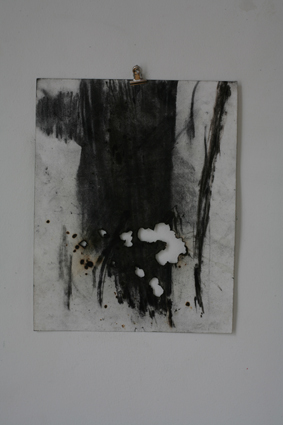
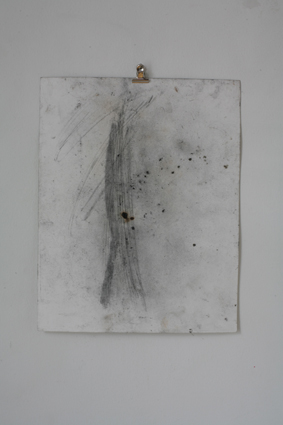
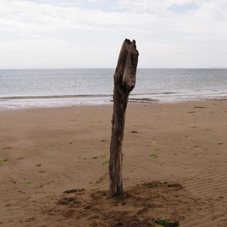
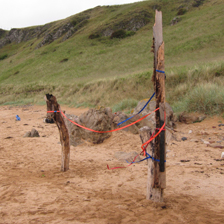

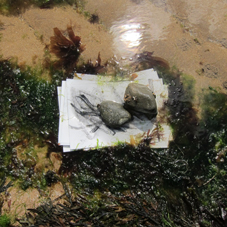

From: Mr Victor Boullet <comb_over@me.com>
Date: 2 janvier 2012 12:25:17 HNEC
To: Joseph Tang <info@galeriejosephtang.com>
Subject: to be read
Dear Joseph, I want to share this with you, but I have no need for this to be part of the show at all, but this little snippet has been very important to me.
From Oxford 1934, several letters from a philosopher was sent to his friend the anthropologist, in the letter he tries to intervene in a friendship that the anthropologist has with a certain poet / playwright. The philosopher was in fact jealous, and he tries to persuade the anthropologist into thinking the that poet / playwright might interfere with the anthropologist own philosophy and materialistic thought. Progress was brought to a halt, because of the human condition.
These subjective notions are my aim.
The complications of being in a relationship with humans without ulterior motives might also be a link to greater understanding.
The three people, and three quotes from each of them.
" A Klee painting named 'Angelus Novus' shows an angel looking as though he is about to move away from something he is fixedly contemplating. His eyes are staring, his mouth is open, his wings are spread. This is how one pictures the angel of history. His face is turned toward the past. Where we perceive a chain of events, he sees one single catastrophe which keeps piling wreckage and hurls it in front of his feet. The angel would like to stay, awaken the dead, and make whole what has been smashed. But a storm is blowing in from Paradise; it has got caught in his wings with such a violence that the angel can no longer close them. The storm irresistibly propels him into the future to which his back is turned, while the pile of debris before him grows skyward. This storm is what we call progress." (Walter Benjamin)

"Important works of art are the ones that aim for an extreme; they are destroyed in the process and their broken outlines survive as the ciphers of a supreme, unnameable truth." (Th. W. Adorno)
"Art is not a mirror held up to reality, but a hammer with which
to shape it." (Bertolt Brecht)
Victor Boullet